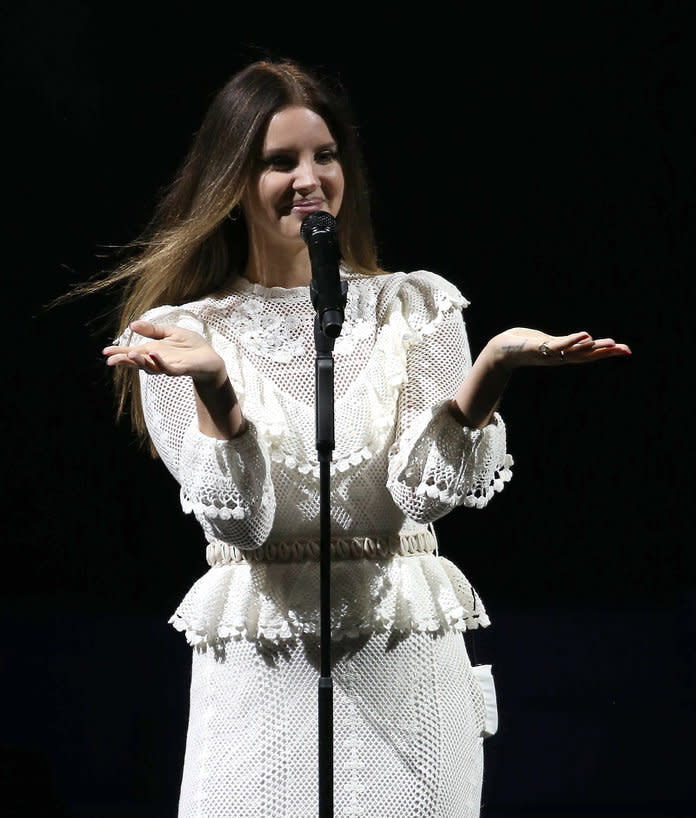Did Coachella Forget that Women Make the Best Headliners?
Another year, another Coachella lineup that reduces women to second and third tiers. On Thursday night, the festival revealed that its three 2020 headliners would be all men: Rage Against the Machine, Frank Ocean, and Travis Scott each claim a top spot in the April 10-19 festival. Of course, there are women in the lineup as there are every year (women make up 36% of the bill, according to the Twitter account Book More Women, up 1% from 2019). But when it came to headliners, they were ignored. Lana Del Rey, who put out one of the best albums of 2019 (and her career) with Norman F—king Rockwell!, was second-billed. You can barely make out Carly Rae Jepsen’s name in the little font on line four. And Charli XCX, perhaps the most innovative pop artist to currently exist, is relegated to the tail-end of line three.
A post shared by Coachella (@coachella) on Jan 2, 2020 at 7:06pm PST
Sure, Lady Gaga, Beyoncé and Ariana Grande were featured the past three years in headlining slots (one per year, because of course there could never be two), but this year’s lineup sends a clear message that even the token single slot isn’t necessary. In 2020, Coachella once again made a decision to diminish the work of female artists.
Women may be the biggest stars in music, but festivals aren’t reflecting that. Lest we forget that in 2019, Billie Eilish and Lizzo were arguably the biggest breakout artists, Taylor Swift became the world’s highest paid celebrity, Ariana Grande made chart history with her album Thank U, Next, and Beyoncé inked a $60 million Netflix deal for three projects. They are at the center of the world’s stage — but not being given due space on the literal ones.
If anything, Del Rey should have been a headliner — clearly, she's available. She's been in the game for as long as Ocean, and has six million more monthly Spotfiy listeners. Last year, she was selling out venues within minutes, and her songwriting was heralded as some of the most poignant commentary of 2019. Why resurrect Rage Against the Machine's anti-establishment message when we already have a modern artist speaking truth to power? Why not give Lana Del Rey her due?

With another set of all male headliners, the festival continues to discount the women who put out records and set records in 2019. By doing that, it ignores a vital part of the festival’s demographic, but more importantly, it hurts female artists. In a time when women’s art is vital, a male-centric festival lineup is a reminder that despite the efforts of the #MeToo movement and Time’s Up, we have a long way to go. It serves as a reminder of Kesha’s heart-wrenching performance of “Praying” — a track aimed at her legal battle with Dr. Luke — at the 2018 Grammys which created a cultural moment allowing her to demand space and time to heal. The performance was powerful and affirming, but that night, she didn’t take home a Grammy, despite receiving two nominations. It was another example of the Catch-22 of progress.
But it’s laughable at this point that we expect anything better from the California festival. Just last year, Grande became the fourth-ever woman to headline Coachella. Prior to Grande, in the festival’s 20-year history, only three women ever headlined — with Björk taking the top slot twice. Instead of any female artists earning the coveted headliner position for a first time, artists like Tool, Rage Against the Machine, Radiohead, Red Hot Chili Peppers, and Arcade Fire have been given headline status multiple times throughout the last two decades. Not for nothing, but possibly no Coachella event has ever received the coverage, nor cultural cachet of Beyoncé’s 2018 Coachella performance, which was nicknamed “Beychella.” She became the first black woman to ever headline the desert festival and she pulled out all the stops (and sister Solange) for a two-hour performance. It had the razzle dazzle production of a movie and was recorded for the Netflix special Homecoming, released just one year following the performance, seemingly signaling that there would be longstanding change coming to the Coachella Valley.
Still, Coachella isn’t the only festival to show us how little has changed in terms of equality at music festivals. The U.K.’s 2020 All Points East Festival has all-male headliners with Tame Impala, Iggy Pop, Glass Animals and Caribou. But Coachella is known to set the tone for festival season — Coachella inspires what festivals across the U.S. look like throughout the year. And those that don’t book with gender equality in mind will continue to be criticized.
RELATED: This Is What it's Like to Attend the Most Gender-Equal Music Festival in the World
Coachella and festival lineups that make men the center of the conversation contribute to what happens when we don’t give women the recognition they deserve. It’s a trickle-down effect that chalks equality, lack of pay equity, and the treatment of women up to lip service. And in an industry that has systematically been built to cater toward men, it gives women — talented women — a reason to leave music and the industry that isn’t always on their side. The one saving grace to the 2020 lineup is that it’s diverse, both in terms of race representation and musical styles. But in terms of gender, the 2020 headliners are an insult, and a reminder that the “progress” since last year was a backslide. Coachella has proven that until festivals make a concerted effort to incorporate women into headliner spots regularly, they won’t be earning any brownie points for making space on rows three and four.

